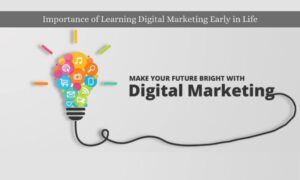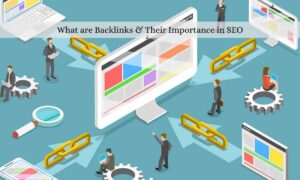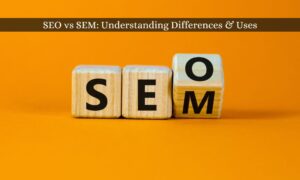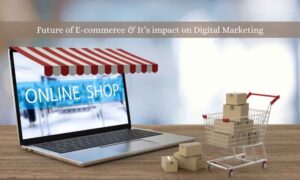Technology Trends in Digital Marketing
Digital Marketing Technology trends go hand in hand. The fast-changing pace of tech evolution is bringing a shift in the way businesses operate. Consequently, these emerging tech trends are shaping the arena of digital marketing significantly. In order to stay at the top of the game, a digital marketer has to stay updated with the latest tools and technologies. In this blog, three of the latest trends in technologies in digital marketing have been discussed in brief.

Generative AI as an emerging Digital Marketing Technology Trend
As the name suggests, Generative AI technology implies creating and generating new content ideas like text, images, and audio. It is one of the Digital Marketing Technology Trends
Content Generation:
One of the most significant applications of Generative AI is content creation. It can generate blog posts, product descriptions, social media captions, and even video scripts. This not only saves time but also ensures a consistent flow of high-quality content.
Personalization:
Generative AI can analyze vast amounts of data to create personalized marketing materials. By tailoring content to individual preferences and behaviors marketers can significantly enhance customer engagement and conversion rates.
Chatbots and Customer Support:
Chatbots powered by Generative AI are becoming increasingly sophisticated. They can provide real-time support to customers, answer queries, and even engage in natural conversations, improving user experience and reducing response times.
Visual Content:
Generative AI can generate visually appealing images and graphics, making it a valuable asset for creating eye-catching advertisements and social media content.
Market Research:
It can analyze vast datasets to identify market trends and consumer sentiment. This data-driven insight helps marketers make informed decisions and develop strategies that resonate with their target audience.
Real-Life Examples:
ChatGPT:
OpenAI’s GPT-3 powers chatbots that can hold natural conversations with users, making them valuable for customer support and engagement.
Netflix:
Netflix uses Generative AI to personalize content recommendations for its users, increasing user retention and satisfaction.
Canva:
Canva utilizes AI to suggest design elements and templates, simplifying the graphic design process for marketers.
In conclusion, Generative AI is a powerful tool that is reshaping digital marketing by automating tasks, enhancing personalization, and fostering creativity. Marketers who harness the potential of Generative AI gain a competitive edge in a rapidly evolving digital landscape. As this technology continues to advance, its role in shaping the future of digital marketing will only become more pronounced. So, if you’re in the digital marketing game, it’s time to embrace the AI revolution!
Data Analytics: A Current Digital Marketing Trend
The practice of data collection to understand what consumers want dates back to the 19th century, however, contemporary methods have undergone dramatic changes, unraveling better dynamics. Data analytics is revolutionizing digital marketing by providing businesses with valuable insights and strategies to enhance their online presence and customer engagement.
Customer Understanding:
Data analytics enables marketers to gain a deep understanding of their target audience. By analyzing customer behavior, preferences, and demographics, businesses can create highly personalized marketing campaigns tailored to individual needs.
Content Optimization:
Through data analytics, marketers can assess the performance of their content in real time. This allows them to refine and optimize content strategies, ensuring that the right message reaches the right audience at the right time.
Predictive Analysis:
Advanced analytics tools use historical data to make predictions about future customer behavior. Marketers can leverage these insights to anticipate trends and customer needs, adjusting their strategies accordingly.
Segmentation and Targeting:
Data analytics allows for precise segmentation of audiences. Marketers can divide their customer base into smaller, more manageable segments, allowing for highly targeted and relevant marketing campaigns.
Performance Measurement:
Key performance indicators (KPIs) are crucial in digital marketing. Data analytics tools track and analyze KPIs in real time, helping marketers assess the effectiveness of their campaigns and make timely adjustments.
Social Media Insights:
Social media platforms generate massive amounts of data. Analytics tools help marketers extract valuable insights from social media data, such as sentiment analysis, engagement metrics, and trend identification.
Conversion Rate Optimization:
By analyzing user journeys and interactions on websites and apps, data analytics can pinpoint bottlenecks and areas for improvement. Marketers can then optimize these elements to enhance conversion rates.
Budget Allocation:
Data analytics assist in making informed decisions about where to allocate marketing budgets. By identifying high-performing channels and campaigns, businesses can invest their resources more efficiently.
Competitive Analysis:
Analyzing competitors’ data provides valuable benchmarks for digital marketing efforts. Marketers can identify gaps in the market, competitive strengths, and weaknesses to refine their strategies.
Real-time decision-making:
In the fast-paced digital world, real-time data analytics enables marketers to make rapid decisions and adjustments to their campaigns, ensuring they stay competitive and responsive to changing market conditions.
Tools like Power BI, Tableau, Excel, Qlik, and Rapid Miner are the most widely used.
Metaverse- an emerging technology trend in Digital Marketing
It is an extended reality that integrates technologies like augmented reality, virtual reality, and artificial intelligence. It merges the physical and digital worlds to influence the way people shop, socialize, learn, play, work, and communicate with each other. Avatars, or digital versions of people, serve as their representation in the metaverse. Millennials, Gen Z, and men make up the bulk of the target market, as reported by a leading survey.
How Can businesses leverage the power of the metaverse?
How Does the Metaverse Impact Digital Marketing?
Immersive Brand Experiences: Companies like Lenskart have harnessed Augmented Reality (AR) within the metaverse. Their AR “Try On” feature lets customers virtually try on eyeglasses, enhancing the shopping experience and increasing conversion rates.
Interactive Advertising: In the metaverse, advertising becomes an immersive experience. Imagine users encountering your brand’s virtual storefront while exploring a digital world. It’s a new level of engagement that can’t be replicated in traditional advertising.
Rich Data Insights: The metaverse provides a treasure trove of user data. By analyzing how users interact with your virtual presence, you can gain deep insights into their preferences and behaviors, enabling highly targeted marketing campaigns.
Community Building: Brands can create and nurture communities within the metaverse. Hosting virtual events or spaces where like-minded individuals gather fosters brand loyalty. For instance, Nike organized a virtual event in Fortnite, strengthening its connection with the gaming community.
Global Reach: The metaverse knows no borders. Your brand can instantly connect with a global audience, breaking down geographical barriers and expanding your market reach exponentially.
Conclusion:
As new tech trends dominate the marketing landscape, the conventional principles of marketing remain equally relevant. It is only when these core concepts of marketing are backed by a good understanding and application of new technologies, that one can achieve stellar outcomes. Therefore, it is imperative to watch out for the new technological trends in digital marketing and leverage them to stay ahead of the curve.
You may also like the best digital marketing institute in Mumbai.
If you are curious to learn about organic farming, then Sap Agro is the perfect destination









